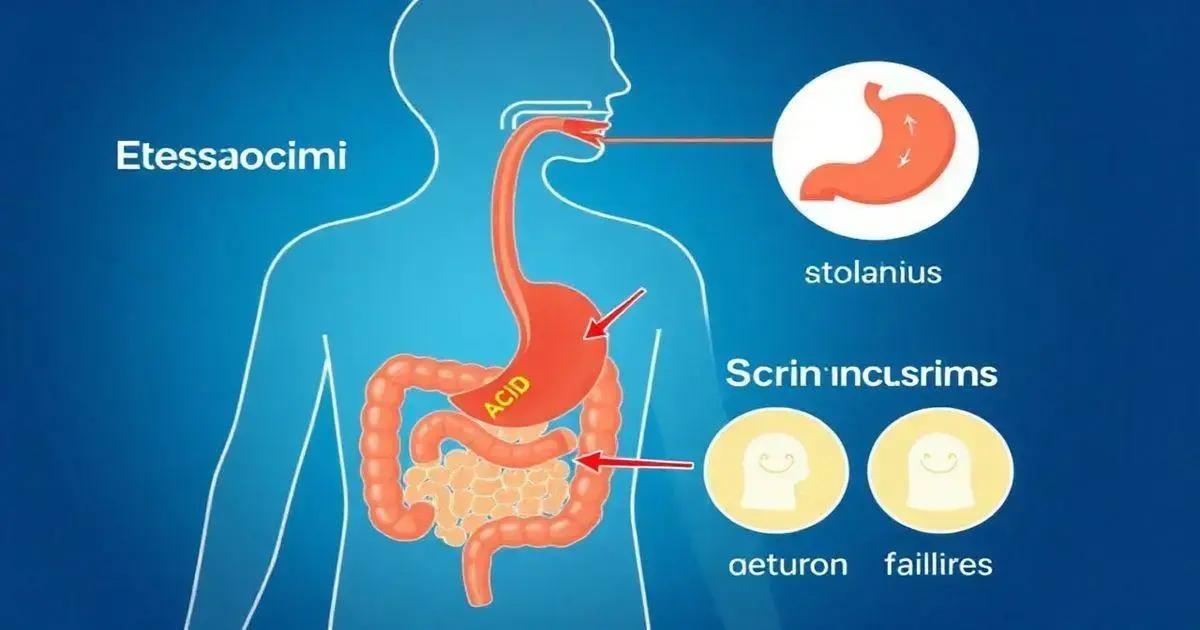To prevent acid reflux with dietary adjustments, include foods like green vegetables, oatmeal, and non-citrus fruits, while avoiding spicy, fatty, and acidic foods. Eating smaller meals, staying upright after eating, and keeping a food diary can also help manage symptoms effectively.
Are you tired of the burning sensation caused by acid reflux? Discover how to prevent acid reflux with dietary adjustments that can transform your eating habits. Making simple, smart choices in your diet is essential for managing this uncomfortable condition. In this article, we’ll uncover effective strategies, from understanding the triggers of acid reflux to practical tips on which foods to include and exclude from your diet. Get ready to reclaim your comfort and well-being!
Understanding Acid Reflux

Acid reflux is a common digestive condition that happens when stomach acid flows back into the esophagus. This occurs when the lower esophageal sphincter (LES) weakens or relaxes when it shouldn’t. The LES is a ring of muscle that acts like a valve between the esophagus and stomach. When it functions correctly, it opens to let food in and closes to keep stomach acid from escaping. However, when it fails to close properly, acid can travel up, causing a burning sensation known as heartburn.
Causes of Acid Reflux
There are many factors that can lead to acid reflux. Some of these include:
- Overeating or consuming large meals
- Eating late at night
- Being overweight or obese
- Smoking and excessive alcohol consumption
- Hiatal hernia
Each of these factors can weaken the LES or increase pressure on the stomach, leading to acid reflux.
Symptoms of Acid Reflux
Common symptoms of acid reflux include:
- Heartburn: a burning sensation in the chest
- Regurgitation: sour or bitter-tasting acid backing up into the throat or mouth
- Dysphagia: the sensation of food being stuck in the throat
- Cough or wheezing
- Chest pain
These symptoms can vary in severity and may occur occasionally or frequently. If left untreated, chronic acid reflux can lead to more serious health issues.
Potential Complications
Chronic acid reflux may lead to complications that include:
- Esophagitis: inflammation of the esophagus
- Esophageal strictures: narrowing of the esophagus
- Barrett’s esophagus: a precancerous condition
Understanding acid reflux is essential in managing it effectively. By making certain dietary adjustments and lifestyle changes, you can reduce the frequency and severity of symptoms.
Best Foods to Include in Your Diet

Including the right foods in your diet can help prevent acid reflux. Here are some of the best foods to add to your meals:
1. Green Vegetables
Eating vegetables like broccoli, spinach, and green beans can help reduce acidity. They are low in fat and high in fiber, making them perfect for a reflux-friendly diet.
2. Oatmeal
Oatmeal is a great breakfast option. It absorbs stomach acid and can help prevent symptoms. You can add fruits or honey for extra flavor without increasing the risk of reflux.
3. Ginger
Ginger has natural anti-inflammatory properties. Adding fresh ginger to your meals or drinking ginger tea can help soothe the digestive system.
4. Lean Proteins
Opt for lean sources of protein like chicken, turkey, and fish. Baking, grilling, or steaming these proteins is better than frying, as it keeps the fat low.
5. Bananas
Bananas are gentle on the stomach and can help neutralize acid. They are also a great source of potassium, which is good for overall health.
6. Whole Grains
Whole grains like brown rice, quinoa, and whole-grain bread provide fiber and nutrients while being easier on your digestive system.
7. Non-citrus Fruits
Fruits like apples, pears, and melons are great for digestion. They have a low acidity level and can help avoid reflux symptoms.
By including these foods in your diet, you can create meals that keep acid reflux at bay while still being delicious and nutritious.
Foods to Avoid for Acid Reflux

Avoiding certain foods is crucial for managing acid reflux. Here is a list of foods to avoid to help keep your symptoms at bay:
1. Spicy Foods
Spices like chili powder and hot pepper can irritate the esophagus and lead to heartburn. It’s best to limit these in your meals to prevent discomfort.
2. Fatty Foods
Foods high in fat, such as fried items, fatty cuts of meat, and full-fat dairy products, can slow digestion and relax the LES, making reflux more likely.
3. Citrus Fruits
While fruits are healthy, citrus fruits like oranges, lemons, and grapefruits are highly acidic. They can increase stomach acidity and worsen symptoms.
4. Tomatoes
Tomatoes and tomato-based products, such as sauces and ketchup, can also trigger heartburn due to their acidity. Opt for lower-acid alternatives when possible.
5. Chocolate
Chocolate contains caffeine and other stimulants that can relax the LES. This increases the chance of acid reflux episodes, so it’s wise to minimize consumption.
6. Carbonated Beverages
Soda and other fizzy drinks can lead to bloating, increasing pressure on the stomach. This can push acid into the esophagus, causing discomfort.
7. Mint
Although mint is often seen as soothing, it can actually relax the LES, allowing stomach acid to creep back up. Avoid peppermint teas and candies.
By steering clear of these foods, you can better manage acid reflux and promote overall digestive health.
Practical Tips for Dietary Changes

Making dietary changes to manage acid reflux can be simple with a few practical tips. Here are some strategies to help you:
1. Eat Smaller Meals
Having smaller, more frequent meals helps reduce pressure on the stomach. Instead of three large meals, try eating five to six smaller meals throughout the day.
2. Chew Your Food Well
Take time to chew your food thoroughly. This helps with digestion and reduces the effort your stomach has to make when processing food.
3. Stay Upright After Eating
Avoid lying down or reclining for at least two to three hours after a meal. Staying upright helps prevent stomach acid from backing up into the esophagus.
4. Keep a Food Diary
Track what you eat and how it affects your reflux symptoms. This can help identify food triggers and aid in making informed dietary decisions.
5. Limit Eating Before Bed
Aim to finish your last meal at least three hours before bedtime. This gives your body time to digest the food and can help prevent nighttime reflux.
6. Be Mindful of Beverages
Drink water and limit caffeinated, alcoholic, and carbonated beverages. Opt for herbal teas and avoid drinks that may aggravate your condition.
7. Gradually Implement Changes
Make dietary adjustments slowly. This makes it easier for your body to adapt and helps you stick to your new routine.
By following these practical tips, you can make effective dietary changes that help prevent acid reflux and improve your overall digestive health.
Managing Acid Reflux Through Dietary Adjustments
Preventing acid reflux requires understanding what foods to include and what to avoid in your diet. By incorporating healthy options like green vegetables, oatmeal, and non-citrus fruits while steering clear of spicy and fatty foods, you can effectively manage your symptoms.
Implementing practical tips, such as eating smaller meals and staying upright after eating, further enhances your ability to keep acid reflux under control. Keeping a food diary can be an invaluable tool in discovering personal triggers.
By making these dietary adjustments, you not only alleviate discomfort from acid reflux but also pave the way for better overall digestive health. With patience and consistency, you can create a diet that supports your well-being and minimizes reflux occurrences.
FAQ – Frequently Asked Questions About Preventing Acid Reflux
What are the main causes of acid reflux?
Acid reflux can be caused by overeating, obesity, certain foods, smoking, and relaxing of the lower esophageal sphincter (LES).
What foods should I include in my diet to prevent acid reflux?
Including green vegetables, oatmeal, lean proteins, non-citrus fruits, and ginger can help manage acid reflux symptoms effectively.
What foods should I avoid if I suffer from acid reflux?
You should avoid spicy foods, fatty foods, citrus fruits, tomatoes, chocolate, carbonated beverages, and mint to reduce acid reflux occurrences.
How can meal timing affect acid reflux?
Eating smaller meals and avoiding food before bedtime can help prevent reflux. Staying upright for a few hours after meals is also important.
Is it helpful to keep a food diary?
Yes! Keeping a food diary can help you identify specific triggers for your acid reflux symptoms and improve your dietary choices.
What practical tips can I use to manage my diet for acid reflux?
Some tips include chewing food thoroughly, drinking water instead of carbonated beverages, and gradually implementing dietary changes.













